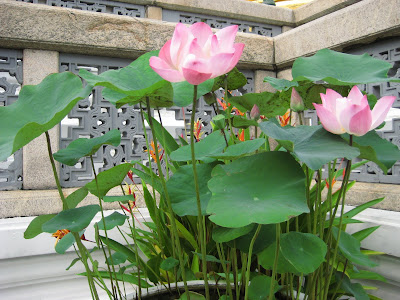Looking at the big pot of water planted with lotus in Thai gardens not only in homes but also in establishments is very relaxing. For Thai people, bua (in Thai) is not merely an ornamental plant but as well as a religious symbol of Buddhism (also Brahmanism).
Legend has it that the Lord Buddha was able to walk on his birth, and that when he took his first seven steps in this mortal world, lotus blooms opened up from underneath to support the tender soles of his feet. So you will see lotus blossoms (in the photo) used as offerings in any temple here in Thailand. Lotus blossoms used for offering
All its parts are edible and its stems are sold ready-to-cook even in supermarkets. It tastes pretty much like gabi (taro) stalks famous in the Philippines for its nutritional value and great taste especially with coconut cream (ginataan). Its flower and fruit are used in cuisines as garnish. According to Wikipedia, lotus roots have been found to be rich in dietary fiber, vitamin C, potassium, thiamin, riboflavin, vitamin B6, phosphorus, copper, and manganese, while very low in saturated fat.
Lotus flower and fruit












.jpg)





1 comments:
Wow!Great!
This is one belief which simply defines one's culture and which tells the world how a group of people sees an object in different ways. Truly, everything has a meaning and a purpose. Well, lotus for me is beauty in a pond!---Dalton25
Post a Comment
Thanks a lot for leaving your thoughts on this post! That makes my day so rest assured that I never take your comments for granted:)